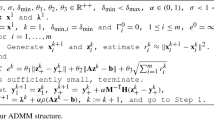Abstract
In this paper we study conjugate gradient algorithms for large optimization problems. These methods accelerate (or precondition) the conjugate gradient method by means of quasi-Newton matrices, and are designed to utilize a variable amount of storage, depending on how much information is retained in the quasi-Newton matrices. We are concerned with the behaviour of such methods on the underlying quadratic model, and in particular, with finite termination properties.
Similar content being viewed by others
References
C.G. Broyden, “The convergence of a class of double rank minimization algorithms”,Journal of the Institute of Mathematics and its Applications 6 (1970) 79–90.
A.G. Buckley, “A combined conjugate-gradient quasi-Newton minimization algorithm”,Mathematical Programming 15 (1978) 200–210.
A.G. Buckley, “Extending the relationship between the conjugate gradient and BFGS algorithms”,Mathematical Programming 15 (1978) 343–348.
J.E. Dennis and J.J. Moré, “Quasi-Newton methods, motivation and theory”,SIAM Review 19 (1977) 46–89.
L.C.W. Dixon, “Conjugate gradient algorithms: quadratic termination properties without line searches”,Journal of the Institute of Mathematics and its Applications 15 (1975) 9–18.
R. Fletcher and C. Reeves, “Function minimization by conjugate gradients”,The Computer Journal 7 (1964) 149–154.
P. Gill and W. Murray, “Conjugate gradient methods for large-scale nonlinear optimization”, Technical Report SOL 79-15, Department of Operations Research, Stanford University, Stanford, CA (1979).
M.R. Hestenes, “The conjugate gradient method for solving linear equations”, in: J. Curtis, ed.,Proceedings of the Sixth Symposium in Applied Mathematics, (American Mathematical Society, Providence, RI, 1956) pp. 83–102.
M.R. Hestenes and E. Stiefel, “Methods of conjugate gradients for solving linear systems”,Journal of Research of the National Bureau of Standards 49 (1952) 409–436.
L. Nazareth, “A conjugate direction algorithm without line searches”,Journal of Optimization Theory and Applications 23 (1977) 373–387.
L. Nazareth, “A relationship between the BFGS and conjugate gradient algorithms and its implications for new algorithms”,SIAM Journal on Numerical Analysis 16 (1979) 794–800.
J. Nocedal, “Convergence analysis of optimization methods that use variable storage”, Technical Report, IIMAS, Universidad Nacional Autonoma de Mexico, Mexico D.F. (1978).
J. Nocedal, “Updating quasi-Newton matrices with limited storage”,Mathematics of Computation 15 (1980) 773–782.
A. Perry, “A class of conjugate gradient algorithms with a two-step variable-metric memory”, Discussion paper 269, Center for Mathematical Studies in Economics and Management Science, Northwestern University (1977).
M.J.D. Powell, “Restart procedures for the conjugate gradient method”,Mathematical Programming 12 (1977) 241–254.
D.F. Shanno, “Conjugate gradient methods with inexact searches”,Mathematics of Operations Research 3 (1978) 244–256.
Author information
Authors and Affiliations
Rights and permissions
About this article
Cite this article
Nazareth, L., Nocedal, J. Conjugate direction methods with variable storage. Mathematical Programming 23, 326–340 (1982). https://doi.org/10.1007/BF01583797
Received:
Revised:
Issue Date:
DOI: https://doi.org/10.1007/BF01583797




